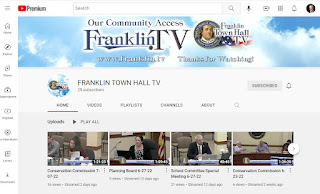The Massachusetts Senate and House passed the Mental Health ABC Act: Addressing Barriers to Care (ABC), comprehensive legislation to continue the process of reforming the way mental health care is delivered in Massachusetts, with the goal of ensuring that people get the mental health care they need when they need it.
The Mental Health ABC Act is driven by the recognition that mental health is as important as physical health for every resident of the Commonwealth and should be treated as such. The final conference report proposes a wide variety of reforms to ensure equitable access to mental health care and remove barriers to care by supporting the behavioral health workforce.
"One moment, many years ago, I made the split-second decision to share the story of my family's struggle with mental illness—a moment of vulnerability and honesty that has become a movement, as more and more people stand up and speak up for accessible, high quality mental health care," stated Senate President Karen E. Spilka (D-Ashland). "We all deserve to have access to the mental health care we need, when we need it, and today we are on the brink to seeing comprehensive mental and behavioral health care reform signed into law. Thank you Senator Julian Cyr and Senator Cindy Friedman for their tireless work on this bill, to Senator Tarr for his work on the conference committee, and to our partners in the House for seeing this through. I'd also like to thank the countless individuals, families, advocates, providers and others who stood up for the common-sense idea that mental health is just as important as physical health, and to everyone who has fought for mental health care reform in Massachusetts and never gave up."
"I'm incredibly proud of the mental health legislation passed today that will help to address the behavioral health crisis that so many of our residents are currently experiencing, and that will move us closer to treating mental and physical health equally," said House Speaker Ronald J. Mariano (D-Quincy). "This legislation builds upon our long-standing efforts to advance important reforms that are aimed at improving our behavioral health care delivery system. I want to thank Chairman Madaro and the conferees, my colleagues in the House, as well as Senate President Spilka and our partners in the Senate for prioritizing increased support for the Commonwealth's mental health infrastructure."
"Today, the Massachusetts Legislature took vital strides toward transforming mental health care in Massachusetts," said Senator Julian Cyr (D-Truro), Senate of the Joint Committee on Mental Health, Substance Use and Recovery. "By unanimously passing the Mental Health ABC Act, we affirm that mental health is just as essential as physical health and take a leap forward to ensure that all people in Massachusetts can access the mental health care they need and deserve. I am deeply grateful to Senate President Karen Spilka for her leadership and example, to Senators Friedman, Rodrigues, and Tarr for their efforts in this most urgent endeavor, and to Representative Madaro for his partnership."
"Too many people in communities across the Commonwealth struggle to get the mental, emotional and behavioral health care they deserve," said Representative Adrian C. Madaro (D-Boston), House Chair of the Joint Committee on Mental Health, Substance Use and Recovery. "This legislation helps reduce barriers to resources, support, and treatment residents need for their overall wellbeing. It enables enforcement of existing parity laws, enhances emergency response services and acute psychiatric care, develops programs to strengthen the workforce, and invests in mental health. Importantly, our legislation also creates initiatives to address the unique mental health needs of young people. This legislation is the first step in addressing the structural deficits in our mental health care delivery system by prioritizing the people it serves and the people who make it work."
"The health care system in Massachusetts is only as strong as its weakest link, and for far too long, mental health care has been overlooked and underfunded," stated Senator Cindy F. Friedman (D-Arlington), Senate Chair of the Joint Committee on Health Care Financing. "This legislation confronts this reality with the most comprehensive mental health care legislation the Commonwealth has seen in recent years, and it builds off of the historic investments we made in this care system over this past two-year legislative session. Of particular importance to me, this bill will finally provide the state the tools it needs to enforce existing mental health parity laws and it will address the emergency department boarding crisis that's impacting too many of our children and their families. I have long believed that Massachusetts should deliver affordable, high quality, and accessible care to its residents, and this includes mental health care."
"With this legislation, the House and Senate make an important investment in mental health care – and in the mental and behavioral health workforce," said Representative Denise C. Garlick (D-Needham), Chair of the House Committee on Bills in the Third Reading. "Every aspect of this bill is rooted in the fact that we support and strengthen health care workers through a focus on health equity, equitable reimbursement, and supporting those who support providers. Every resident will benefit from a stronger workforce providing care."
"This bill takes major and necessary steps to advance and strengthen the delivery of mental health care in our Commonwealth, by securing parity with physical health care, moving pediatric mental health patients expeditiously from emergency departments to more appropriate treatment settings. I am pleased that amendments that I offered to address mental health needs of police, firefighters, EMTs, and other first-responders are included as well as the requirement that online portals with updated information and resource will be available in real-time," said Senate Minority Leader Bruce Tarr (R- Gloucester), a member of the conference committee. "These and other components of the bill make the identification and treatment of mental health in our Commonwealth stronger, better, and more effective so that people in need of care can better access essential resources in the right place and provided by the right people."
"This legislation is a sea-change, greatly improving access to mental and behavioral health services and addressing some of the most challenging aspects of delivering this critical health care to all," stated Representative Hannah Kane (R-Shrewsbury). "Far too many families have seen loved ones suffering and unable to access the short and long term care they need to get well and be well, my family included. I am grateful for the work of the conferees and the leadership of the Legislature."
The following is an overview of The Mental Health ABC Act:
Guaranteeing Annual Mental Health Wellness Exams. A cornerstone of this reform is the idea that a person's mental health is just as important as a person's physical health. This bill would codify this principle by mandating coverage for an annual mental health wellness exam, comparable to an annual physical.
Enforcing Mental Health Parity Laws. This bill provides the state with better tools to implement and enforce parity laws by creating a clear structure for the Division of Insurance to receive and investigate parity complaints and ensure their timely resolution. Other tools include parity enforcement for commercial, state-contracted and student health insurance plans, increased reporting and oversight of insurance carriers' mental health care coverage processes and policies, and reasonable penalties and alternative remedies for when an insurance company does not comply with the law.
Initiatives to Address Emergency Department Boarding. For many people with acute mental health needs, the only place to get help is an emergency department (ED). Unfortunately, these patients may wait days, weeks, and even months for more appropriate admission to an inpatient psychiatric unit or less acute level of care. This is referred to as 'boarding,' which continues to rise dramatically. This legislation tackles this by creating online portals that provide access to real-time data on youth and adults seeking mental health and substance use services and includes a search function that allows health care providers to easily search and find open beds using several criteria; requiring the Health Policy Commission (HPC) to prepare and publish a report every three years on the status of pediatric behavioral health as the youth boarding crisis is particularly acute; requiring the Center for Health Information and Analysis (CHIA) to report on behavioral health needs; updating the expedited psychiatric inpatient admissions (EPIA) protocol and creating an expedited evaluation and stabilization process for patients under 18; codifying in statute the working group tasked with implementing the EPIA in law.
988 Implementation and 911 Expansion. This legislation increases access to immediate behavioral health care through the implementation of the nationwide 988 hotline to access 24/7 suicide prevention and behavioral health crisis services. This legislation also expands 911 to bridge the gap until 988 is implemented by increasing training, funding, and capacity for regional emergency responses to behavioral health crises.
Red Flag Laws and Extreme Risk Protection Orders. This bill initiates a public awareness campaign on the Commonwealth's red flag laws and extreme risk protection orders (ERPOs) that limit access to guns for people at risk of hurting themselves or others.
Reimbursing Mental Health Providers Equitably. Mental health and primary care providers are reimbursed at different rates for the same service. The bill seeks to level the playing field for reimbursement to mental health providers by requiring an equitable rate floor for evaluation and management services that is consistent with primary care.
Reforming Medical Necessity and Prior Authorization Requirements. This bill mandates coverage and eliminates prior authorization for mental health acute treatment and stabilization services for adults and children. It also establishes a special commission to bring all stakeholders to the table to study and make recommendations on the creation of a common set of medical necessity criteria to be used by health care providers and insurance carriers for mental health services.
Creating a Standard Release Form. Behavioral health providers struggle in the era of electronic health records and care coordination to create systems that simultaneously protect an individual's right to consent to share sensitive health information and allow practitioners to access the information they need to treat the individual and coordinate care. This bill directs the development of a standard release form for exchanging confidential mental health and substance use disorder information to facilitate access to treatment by patients with multiple health care providers.
Increasing Access to Emergency Service Programs. Emergency Service Programs (ESPs), which are community-based and recovery-oriented programs that provide behavioral health crisis assessment, intervention, and stabilization services for people with psychiatric illness, are currently covered by MassHealth. The bill would require commercial insurance companies to cover ESPs as well.
Expanding Access to the Evidence-Based Collaborative Care Model. The collaborative care model delivers mental health care in primary care through a team of health care professionals, including the primary care provider, a behavioral health care manager, and a consulting psychiatrist. This evidence-based access to mental health care has proven effective, less costly, and less stigmatizing. The bill would expand access to psychiatric care by requiring the state-contracted and commercial health plans to cover mental health and substance use disorder benefits offered through the psychiatric collaborative care model.
Reviewing the Role of Behavioral Health Managers. Some insurance companies have subcontracted mental health benefits to specialty utilization management companies for years with mixed results. The bill directs the Health Policy Commission, in consultation with the Division of Insurance, to study and provide updated data on the use of contracted mental health benefit managers by insurance carriers, often referred to as 'carve-outs.'
Tracking and Analyzing Behavioral Health Expenditures. This bill includes a critical first steps toward incentivizing greater investments in mental health care within the analysis of statewide health care cost growth. Specifically, the bill directs the Center for Health Information and Analysis (CHIA) to define and collect data on the delivery of mental health services to establish a baseline of current spending.
Establishing an Office of Behavioral Health Promotion. Current behavioral health promotion activities are spread across state agencies. This dilutes the responsibility for mental health promotion and focus on the issues and undermines the important work being done. The bill establishes an Office of Behavioral Health Promotion within the Executive Office of Health and Human Services (EOHHS) to coordinate all state initiatives that promote mental, emotional, and behavioral health and wellness for residents. The new office is tasked with tailoring mental health messaging and intervention to veterans and first responders. It also creates a student advisory council to guide the office on meeting the mental health needs of the Commonwealth's students.
Increasing Access to Care in Geographically Isolated Areas. This bill directs the Department of Mental Health (DMH) to consider factors that may present barriers to care—such as travel distance and access to transportation—when contracting for services in geographically isolated and rural communities.
Enhancing School-based Behavioral Health Services and Programming. This bill improves the wellness of young people by enhancing school-based behavioral health supports and increasing access points for effective behavioral health treatment by limiting the use of suspension and expulsion in all licensed early education and care programs and creating a statewide program to help schools implement school-based behavioral health services.
Increasing Access Points for Youth for Effective Behavioral Health Treatment. To support treatment accessibility for young people, this bill requires behavioral health assessments and referrals for children entering the foster care system.
Expanding Insurance Coverage for Vulnerable Populations. Critically, this legislation implements a technical fix to ensure individuals over 26 years old who live with disabilities can remain on their parents' health insurance.
Creating a Roadmap on Access to Culturally Competent Care. Under this provision, an interagency health equity team under the Office of Health Equity, working with an advisory council, will make annual recommendations for the next three years to improve access to, and the quality of, culturally competent mental health services. Paired with the Legislature's ARPA investment of $122 million in the behavioral health workforce through loan repayment assistance programs, this roadmap will make great strides toward building a robust workforce reflective of communities' needs.
Allows for an Interim Licensure for Licensed Mental Health Counselors. The bill creates an interim licensure level for Licensed Mental Health Counselors (LMHCs) so that they can be reimbursed by insurance for their services and be eligible for state and federal grant and loan forgiveness programs, further increasing the number of licensed providers able to serve patients.
Expanding Mental Health Billing. This bill allows clinicians practicing under the supervision of a licensed professional and working towards independent licensure to practice in a clinic setting. This will help to ensure quality training and supervision and encourage clinicians to stay practicing in community-based settings.
Updating the Board of Registration of Social Workers. The bill updates the membership of the Board of Registration of Social Workers to clarify that designees from the Department of Children and Families (DCF) and Department of Public Health (DPH) be licensed social workers.
Having passed both Senate and the House of Representatives, this legislation will be laid before the Governor for his consideration.
Legislation text can be found -> https://malegislature.gov/Bills/192/S3097
 |
| Legislature Passes Landmark Mental Health Reform |






